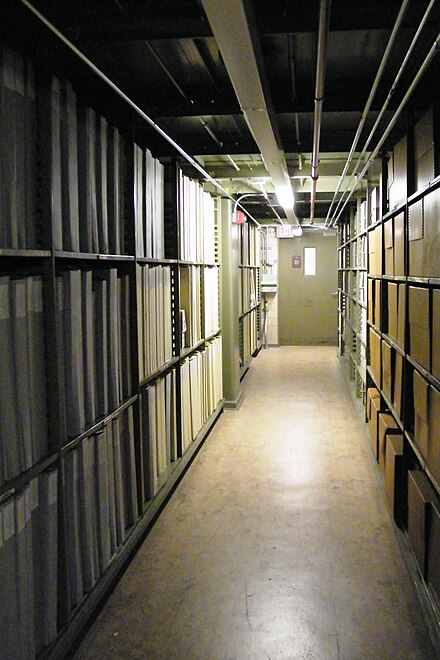Archive
An archive is an accumulation of historical records or materials – in any medium – or the physical facility in which they are located.[1][2]
Archives contain primary source documents that have accumulated over the course of an individual or organization's lifetime, and are kept to show the function of that person or organization. Professional archivists and historians generally understand archives to be records that have been naturally and necessarily generated as a product of regular legal, commercial, administrative, or social activities. They have been metaphorically defined as "the secretions of an organism",[3] and are distinguished from documents that have been consciously written or created to communicate a particular message to posterity.
In general, archives consist of records that have been selected for permanent or long-term preservation on grounds of their enduring cultural, historical, or evidentiary value. Archival records are normally unpublished and almost always unique, unlike books or magazines of which many identical copies may exist. This means that archives are quite distinct from libraries with regard to their functions and organization, although archival collections can often be found within library buildings.[4]
A person who works in archives is called an archivist. The study and practice of organizing, preserving, and providing access to information and materials in archives is called archival science. The physical place of storage can be referred to as an archive (more usual in the United Kingdom), an archives (more usual in the United States), or a repository.[5][6]
The computing use of the term "archive" should not be confused with the record-keeping meaning of the term.
The English word archive /ˈɑːrkaɪv/ is derived from the French archives (plural), and in turn from Latin archīum or archīvum,[7] the romanized form of the Greek ἀρχεῖον (arkheion). The Greek term originally referred to the home or dwelling of the Archon, a ruler or chief magistrate, in which important official state documents were filed and interpreted; from there its meaning broadened to encompass such concepts as "town hall" and "public records".[8] The root of the Greek word is ἀρχή (arkhē), meaning among other things "magistracy, office, government",[9] and derived from the verb ἄρχω (arkhō), meaning "to begin, rule, govern" (also the root of English words such as "anarchy" and "monarchy").[10]






